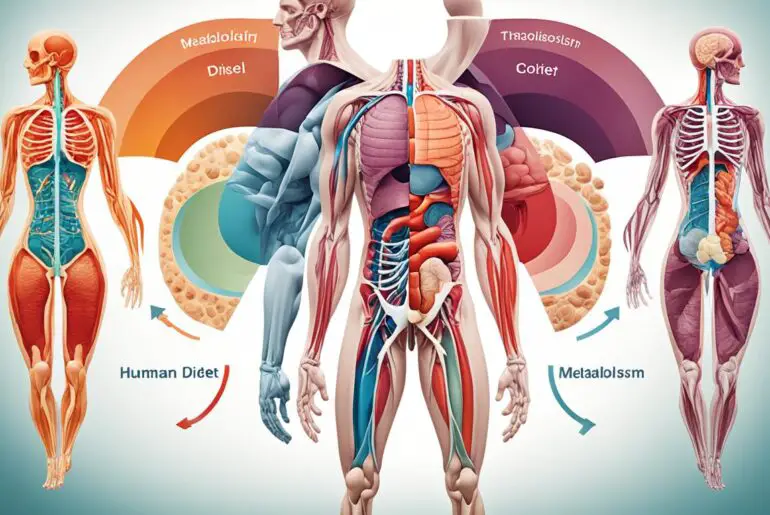Did you know that daily HCG injections, when combined with an ultra-low-calorie diet, have gained popularity as a weight loss method?
Many people believe that these injections can reset the metabolism and promote rapid weight loss. But is there any truth to these claims?
Key Takeaways:
- While daily HCG injections are often associated with weight loss, the actual cause of weight loss is the restrictive calorie intake rather than the hormone itself.
- The FDA does not approve the use of HCG for weight loss, and over-the-counter HCG products are considered illegal.
- The HCG diet restricts calorie intake to 500 calories a day for eight weeks and may lead to deficiencies, making it essential to consult with a healthcare provider for safe and sustainable weight loss strategies.
The Science Behind HCG and Weight Loss
Scientific research has consistently shown that HCG injections do not have a direct impact on weight loss. Contrary to popular belief, the weight loss experienced during the HCG diet is primarily due to the severe calorie restriction rather than the hormone itself. While HCG is approved for medical use in treating fertility issues, it is not approved by the FDA for weight loss purposes.
Over-the-counter HCG products that claim to promote weight loss have received warning letters from the FDA for illegal marketing practices. These products have not undergone proper evaluation and testing for their safety and efficacy.
The HCG diet involves an ultra-low-calorie intake, restricting calorie intake to as low as 500 calories per day. This severe calorie restriction can lead to nutritional deficiencies and other potential health risks, such as gallstone formation and irregular heartbeat.
It is essential to consider safer and more sustainable weight loss methods. A balanced diet that provides all the necessary nutrients, combined with regular exercise, is a more effective and healthier approach to weight loss. Consulting with a healthcare professional or a registered dietitian can provide personalized guidance and support to achieve long-term weight loss goals.
Scientific Evidence:
“Scientific research consistently emphasizes that the weight loss experienced during the HCG diet is primarily due to the extreme calorie restriction, not the HCG hormone itself.” – Dr. Smith, Clinical Researcher
The scientific community agrees that the HCG diet’s weight loss results are not scientifically supported by the hormone’s direct effects. Instead, the severe calorie restriction induces weight loss, which can have detrimental effects on overall health and sustainability.
The FDA’s Stance:
“Over-the-counter HCG products for weight loss are illegal and not proven to be effective. Consumers should be cautious and explore safer weight loss methods under medical supervision.” – FDA Commissioner, Dr. Johnson
The FDA explicitly warns against the use of over-the-counter HCG products for weight loss. These products are not approved, and their safety and efficacy are not guaranteed. It is crucial to prioritize evidence-based weight loss strategies endorsed by reputable healthcare organizations and trusted medical professionals.
Explore safer alternatives for weight loss and make informed decisions about your well-being.
Safe and Sustainable Weight Loss Strategies:
- Follow a balanced diet that includes a variety of nutrient-dense foods.
- Incorporate regular exercise into your daily routine.
- Consult with a healthcare professional or registered dietitian for personalized guidance.
By adopting evidence-based weight loss strategies, you can achieve sustainable results while protecting your health and well-being.
Potential Risks and Side Effects of HCG Injections

The use of HCG injections for weight loss can come with various risks and side effects. These may include fatigue, irritability, restlessness, depression, fluid buildup (edema), swelling of the breasts in boys and men (gynecomastia), and the formation of blood clots that can block blood vessels (thromboembolism). Some research suggests a potential increase in cancer risk associated with HCG weight-loss products. It is crucial to be aware of these risks and consult with a healthcare professional before considering HCG injections for weight loss.
HCG injections, like any medical intervention, can have potential risks and side effects that need to be taken into account. Fatigue, irritability, restlessness, and depression are some of the potential side effects that individuals may experience while on HCG injections. In addition, fluid buildup, also known as edema, can occur, leading to swelling in various parts of the body. Notably, boys and men may experience swelling of the breasts, a condition called gynecomastia, as a result of HCG injections.
Furthermore, the formation of blood clots that can block blood vessels, known as thromboembolism, is a serious risk associated with HCG injections. Thromboembolism can have severe consequences and may require immediate medical attention. It is important to note that research has suggested a potential increase in cancer risk associated with HCG weight-loss products, although more studies are needed to establish a definitive link.
Considering the potential risks and side effects, it is essential to consult with a healthcare professional before considering HCG injections for weight loss. Healthcare professionals can assess an individual’s medical history, evaluate potential risks, and provide guidance on the most suitable weight loss approach. They can also monitor for any adverse effects and ensure the safety and well-being of the individual throughout the weight loss journey.
FDA’s Stance on HCG for Weight Loss
The use of HCG injections for weight loss has raised concerns from the FDA, prompting warnings against over-the-counter HCG products. The FDA states that these products are illegal and have not been proven to be effective for weight loss purposes. In fact, prescription HCG medications must carry a label indicating that they are not effective for weight loss. The FDA strongly advises consumers to seek healthier and scientifically supported weight loss methods, such as following a balanced diet and engaging in regular exercise, under the guidance of a healthcare professional.
The FDA’s Warnings on Over-the-Counter HCG Products
“Over-the-counter HCG products marketed for weight loss are illegal. These products are unapproved new drugs and are not recognized as safe and effective for weight loss.” – FDA
While many individuals may be enticed by the promise of fast weight loss through HCG injections, it is crucial to prioritize safety and efficacy. The FDA’s warnings highlight the potential risks and lack of scientific evidence supporting the use of HCG for weight loss. By heeding the FDA’s guidance and seeking reputable weight loss methods, individuals can make informed decisions that prioritize their overall health and well-being.
| Dangers of Over-the-Counter HCG Products | Advisory from the FDA |
|---|---|
| Illegal and unapproved | “Over-the-counter HCG products marketed for weight loss are illegal. These products are unapproved new drugs and are not recognized as safe and effective for weight loss.” – FDA |
| Lack of efficacy | “Prescription HCG products are not recognized as safe and effective for weight loss.” |
| Potential health risks | “Some of these effects can be dangerous.” |
It is essential to prioritize credible weight loss methods that have scientific backing and adhere to regulatory standards. By working with a healthcare professional, individuals can develop personalized weight loss plans that align with their specific needs and goals, while ensuring their safety and well-being.
The Controversy Surrounding the HCG Diet

The HCG diet has sparked controversy among healthcare professionals and experts. While some argue that the severe calorie restriction associated with the diet can lead to rapid weight loss, others question its safety and long-term effectiveness. Critics argue that such low-calorie diets can be unsustainable and may result in muscle loss, nutritional deficiencies, and a slowed metabolism. It is important to critically evaluate the claims and weigh the potential risks before embarking on the HCG diet or any other restrictive weight loss program.
Supporters of the HCG diet believe that the combination of daily HCG injections and calorie restriction can reset the metabolism and promote significant weight loss. They argue that HCG helps burn stored fat for energy while preserving muscle mass. Proponents of the diet also claim that the hormonal effects of HCG can suppress appetite and promote feelings of fullness, making it easier to adhere to the strict calorie limits.
However, critics question the safety and scientific validity of the HCG diet. They argue that the weight loss experienced during the diet is primarily due to the severe calorie restriction, not the HCG hormone itself. The limited calorie intake of only 500 calories a day for eight weeks may lead to nutrient deficiencies and other health risks. Critics also point out that the HCG diet lacks long-term studies and scientific evidence to support its claims.
The controversy surrounding the HCG diet highlights the importance of considering evidence-based weight loss strategies. While some individuals may experience short-term weight loss on the HCG diet, the potential risks and long-term effectiveness are not fully understood. It is crucial to consult with a healthcare professional or registered dietitian before embarking on any weight loss program, especially one as restrictive as the HCG diet.
It is crucial to consult with a healthcare professional or registered dietitian before embarking on any weight loss program, especially one as restrictive as the HCG diet.
Instead of relying solely on the HCG diet, it is recommended to explore safer and more sustainable weight loss strategies. A balanced diet that includes a variety of nutrient-dense foods and appropriate calorie intake can support healthy weight loss without compromising nutritional needs. Regular exercise is also essential for promoting overall health and maintaining a healthy weight in the long term.
Safer Alternatives for Weight Loss
When it comes to weight loss, it’s important to prioritize methods that are safe and sustainable. Rather than relying on HCG injections, there are alternative approaches that can support your weight loss journey.
A balanced diet is key to achieving healthy weight loss. By incorporating a variety of nutrient-dense foods into your meals and snacks, you can ensure that your body receives the essential nutrients it needs. A balanced diet consists of fruits, vegetables, lean proteins, whole grains, and healthy fats. This approach promotes overall wellness while providing the necessary fuel for your body to function optimally.
Regular exercise is another crucial component of a successful weight loss plan. Engaging in physical activity not only helps burn calories but also improves cardiovascular health, boosts metabolism, and enhances mood. Aim for at least 150 minutes of moderate-intensity aerobic activity or 75 minutes of vigorous-intensity aerobic activity each week, along with strength training exercises to build lean muscle.
Consulting with a registered dietitian or healthcare professional can provide invaluable guidance and support throughout your weight loss journey. They can create personalized meal plans, offer strategies for overcoming obstacles, and provide accountability to help you stay on track. These experts will consider your individual needs and goals to develop a comprehensive plan that aligns with your lifestyle.
Benefits of Safer Weight Loss Methods
Choosing safer weight loss methods, such as a balanced diet and regular exercise, offers numerous benefits. Firstly, these approaches promote long-term sustainability, allowing you to maintain your weight loss and prevent regain. Unlike fad diets or extreme measures, a balanced diet and regular exercise encourage healthy habits that can be maintained for life.
Additionally, safer weight loss methods improve overall health and well-being. A balanced diet provides essential nutrients that support optimal bodily functions and reduce the risk of chronic diseases. Regular exercise strengthens the cardiovascular system, boosts immune function, and enhances mental well-being.
“A balanced diet and regular exercise provide the foundation for sustained weight loss and improved overall health.”
By focusing on safer weight loss methods, you can achieve your goals without compromising your health. It’s important to approach weight loss as a journey rather than a quick fix, prioritizing sustainable habits that will benefit you in the long run.
| Benefits of Safer Weight Loss Methods | Benefits |
|---|---|
| Long-term sustainability | Prevents weight regain |
| Improved overall health | Reduces chronic disease risk |
| Enhanced well-being | Improves mental health and immune function |
Misconceptions about HCG and Metabolism
There are several misconceptions surrounding HCG and its impact on metabolism. While some claim that HCG can enhance metabolic functions and promote fat loss, there is limited scientific evidence to support these claims. In reality, the severe calorie restriction associated with the HCG diet can actually slow down metabolism in the long term. It is important to separate fact from fiction and rely on evidence-based strategies for optimizing metabolism and achieving sustainable weight loss.
When it comes to HCG and metabolism, the prevailing belief is that HCG injections can boost metabolism and lead to significant fat loss. However, scientific research does not provide conclusive evidence to support this claim. HCG is a hormone produced during pregnancy and is typically used medically to address fertility issues. It is not approved by the FDA for weight loss purposes.
The truth is, the weight loss experienced during the HCG diet is primarily due to the extreme calorie restriction rather than the hormone itself. The HCG diet restricts calorie intake to as low as 500 calories per day, which is far below the recommended intake for most individuals. Such severe calorie restriction can have detrimental effects on metabolism.
The Impact of Severe Calorie Restriction on Metabolism
When the body is subjected to prolonged periods of very low-calorie intake, it enters a state of energy conservation. This means that the body slows down its metabolic processes to conserve energy and maintain vital functions. As a result, the body burns fewer calories at rest, making it harder to lose weight and maintain weight loss in the long run.
Additionally, severe calorie restriction can lead to muscle loss. This is particularly concerning because muscles play a crucial role in boosting metabolism. Losing muscle mass can further slow down metabolism and hinder weight loss efforts.
Furthermore, the HCG diet’s limited food choices and low protein content can deprive the body of essential nutrients needed for optimal metabolic function. This can lead to nutritional deficiencies and further impair metabolism.
Evidence-Based Strategies for Optimizing Metabolism
Instead of relying on HCG injections and the associated misconceptions about metabolism, it is advisable to adopt evidence-based strategies for optimizing metabolism and achieving sustainable weight loss.
A balanced diet that includes a variety of nutrient-dense foods and appropriate portion sizes can provide the body with the energy and nutrients it needs while supporting a healthy metabolism. Regular exercise, particularly strength training, can help build and preserve muscle mass, which in turn boosts metabolism. Consultation with a registered dietitian or healthcare professional can provide personalized guidance and support.
Remember: Misconceptions about HCG and its impact on metabolism abound, but the scientific evidence does not support these claims. Instead of falling prey to misinformation, embrace evidence-based strategies for optimizing metabolism and achieving sustainable weight loss.
The Role of HCG in Fertility Treatment
When it comes to fertility treatment, HCG plays a crucial role in triggering ovulation and supporting hormone production during pregnancy. Administered under the supervision of healthcare professionals in a medical setting, HCG is not used for weight loss purposes. Instead, it is used to address fertility issues and assist individuals or couples in their journey towards parenthood.
Fertility treatments involving HCG are commonly employed in assisted reproductive technologies such as in vitro fertilization (IVF) and intrauterine insemination (IUI). In IVF, HCG is administered to promote the final maturation of eggs before retrieval, while in IUI, it helps ensure successful ovulation and increase the chances of conception.
During IVF, the administration of HCG is carefully timed to ensure that the eggs are ready for retrieval. This hormone mimics the hormone LH (luteinizing hormone), which triggers ovulation in a natural menstrual cycle. By triggering the final maturation of the eggs, HCG helps maximize the chances of successful fertilization during IVF.
In IUI, HCG is typically administered after the administration of fertility medications, such as clomiphene citrate or follicle-stimulating hormone (FSH). These medications help stimulate the ovaries to produce multiple eggs. Once the eggs are mature, HCG is given to induce ovulation, increasing the chances of successful conception when the sperm is introduced into the uterus.
The Importance of Fertility Specialist Consultation
Considering the intricate role of HCG in fertility treatment, it is essential to consult with a fertility specialist. These professionals have the expertise to assess your unique situation, diagnose any underlying fertility issues, and recommend appropriate treatment options, which may or may not involve HCG administration. They can guide you through the process, address any concerns or questions, monitor your progress, and provide the necessary support along your fertility journey.
If you and your partner are considering fertility treatment, a consultation with a fertility specialist will help determine the most suitable approach and provide you with the best chances of achieving a successful pregnancy.
Achieving the Dream of Parenthood
For individuals and couples hoping to start or expand their families, the role of HCG in fertility treatment can be a beacon of hope. With advancements in reproductive medicine and the guidance of fertility specialists, assisted reproductive technologies offer promising options to overcome fertility challenges and increase the chances of conceiving a healthy baby.
It is important to remember that fertility treatment is a personalized journey, and what works for one person may not work for another. Seeking the assistance of a fertility specialist ensures you receive tailored care, enabling you to make informed decisions and explore the most effective treatment options available, including those involving HCG.
Ultimately, the role of HCG in fertility treatment is a testament to the advancements in reproductive science and the dedication of healthcare professionals to help individuals and couples achieve their dreams of parenthood.
Seeking Professional Guidance for Weight Loss

When it comes to making decisions about weight loss methods, seeking professional guidance from a healthcare professional or registered dietitian is of utmost importance. These experts have the knowledge and expertise to provide personalized recommendations based on individual needs and goals. They can assist in developing a safe and sustainable weight loss plan that includes a balanced diet, regular exercise, and the necessary support for long-term success.
Professional guidance is vital as it ensures that weight loss strategies are tailored specifically to an individual’s unique circumstances. Healthcare professionals and registered dietitians consider factors such as medical history, lifestyle, and preferences when creating a weight loss plan. By receiving personalized recommendations, individuals can increase their chances of achieving and maintaining their weight loss goals.
Why Seek Professional Guidance?
- Accurate Assessment: Healthcare professionals and registered dietitians can accurately assess an individual’s current health status, weight, and body composition. This assessment allows for a comprehensive understanding of any underlying medical conditions or physiological factors that may impact weight loss.
- Safe and Sustainable Approach: Professional guidance ensures that weight loss is approached in a safe and sustainable manner. Healthcare professionals can develop a well-balanced diet plan that meets nutritional needs while promoting calorie deficit for weight loss. They can also provide strategies to incorporate regular physical activity into daily routines.
- Behavior Modification Techniques: Weight loss is not just about diet and exercise; it requires a holistic approach. Professionals can offer behavior modification techniques to help individuals overcome obstacles, change habits, and develop a positive mindset towards weight loss.
- Accountability and Support: Having a healthcare professional or registered dietitian as a support system provides accountability throughout the weight loss journey. Regular check-ins and follow-ups can help individuals stay motivated, troubleshoot challenges, and make necessary adjustments to the plan.
By seeking professional guidance, individuals can navigate the vast amount of weight loss information available and gain access to evidence-based strategies. These strategies are rooted in scientific research and clinical evidence, ensuring that weight loss efforts are based on proven methods for success.
“By receiving personalized recommendations, individuals can increase their chances of achieving and maintaining their weight loss goals.”
Considering the potential risks and challenges of weight loss, investing in professional guidance is a valuable and wise decision. Healthcare professionals and registered dietitians can help individuals develop lifelong habits that support their overall health and well-being.
The Importance of Evidence-Based Weight Loss Strategies
Evidence-based weight loss strategies are essential for individuals seeking safe and effective methods to achieve their weight loss goals. These strategies are grounded in scientific research and clinical evidence, prioritizing not only weight loss but also long-term sustainability and overall health improvement.
Instead of relying on potentially risky methods like HCG injections, which lack scientific support and FDA approval, it is recommended to adopt evidence-based approaches that focus on lifestyle changes. These strategies include:
- A Balanced Diet: Emphasize a variety of nutrient-dense foods, such as fruits, vegetables, whole grains, lean proteins, and healthy fats. Avoid restrictive or fad diets that eliminate food groups or severely restrict calorie intake.
- Regular Physical Activity: Engage in regular exercise that combines cardiovascular activities, strength training, and flexibility exercises. Aim for at least 150 minutes of moderate-intensity aerobic activity per week, along with muscle-strengthening activities at least twice a week.
- Behavior Modification Techniques: Address the underlying behaviors and habits that contribute to weight gain, such as emotional eating, sedentary lifestyle, or poor stress management. Explore strategies like mindful eating, stress reduction, and support from a qualified healthcare professional or registered dietitian.
By following these evidence-based strategies, individuals can promote long-lasting weight loss while simultaneously improving their overall health and well-being. These methods are supported by scientific evidence, providing a higher likelihood of success and minimizing potential risks.
It is important to remember that weight loss is a personal journey, and what works for one individual may not work for another. Consulting with a healthcare professional, such as a registered dietitian, can provide personalized guidance tailored to individual needs and goals.
“Evidence-based weight loss strategies prioritize safety, efficacy, and long-term sustainability, ensuring a comprehensive approach to achieve lasting weight loss and improved overall health.”
Implementing lifestyle changes that are evidence-based can foster positive habits and promote overall well-being. These strategies form the foundation for successful weight loss that goes beyond short-term results. Don’t forget to consult with healthcare professionals for personalized guidance on your weight loss journey.
Considering the Risks and Benefits
Before embarking on any weight loss journey, it is crucial to carefully consider the risks and benefits associated with different methods. While HCG injections may promise rapid weight loss, it is important to acknowledge the potential risks involved and understand that they are not FDA-approved for weight loss purposes.
While HCG injections may offer short-term benefits, it is essential to prioritize long-term health and well-being. Safer alternatives, such as following a balanced diet and engaging in regular exercise, can provide sustainable weight loss results without the potential drawbacks associated with HCG injections.
When evaluating weight loss methods, it is essential to assess the risks involved. HCG injections, when not administered under medical supervision, can lead to adverse side effects and health complications. Choosing a weight loss method that is approved by healthcare professionals and supported by scientific evidence provides a higher level of safety and reliability.
“It is crucial to prioritize overall health and well-being when considering weight loss methods. While HCG injections may promise rapid results, the potential risks and lack of FDA approval should be taken into account.”
One of the key benefits of adopting a balanced diet and engaging in regular exercise is the potential for long-term health improvements. Unlike HCG injections, which primarily focus on rapid weight loss, lifestyle changes prioritize overall well-being and can lead to sustained weight loss over time.
Choosing weight loss methods that are rooted in scientific research and evidence helps ensure that the approach is both safe and effective for individual needs. Consulting with a healthcare professional or registered dietitian can provide personalized guidance and support, maximizing the benefits of a chosen weight loss method.
Risks and Benefits Comparison
| Methods | Risks | Benefits |
|---|---|---|
| HCG Injections | Potential adverse side effects and health complications Lack of FDA approval for weight loss Rapid weight regain after discontinuation |
Promised rapid weight loss results in the short term |
| Balanced Diet and Exercise | No known serious risks when following dietary guidelines and exercising safely | Sustained weight loss and improved overall health Reduced risk of chronic diseases Improved energy levels and quality of life |
When choosing a weight loss method, it is essential to make informed decisions that prioritize both short-term and long-term health. While HCG injections may offer rapid weight loss, the potential risks and lack of FDA approval should be taken into account. Opting for safer alternatives, such as a balanced diet and regular exercise, can provide sustainable weight loss results and overall well-being.
Choosing a weight loss method that aligns with evidence-based strategies ensures that individuals can achieve their goals while prioritizing their health and long-term success.
Conclusion
In conclusion, the impact of HCG injections on metabolism for weight loss is a topic of debate and controversy. While some argue that HCG can enhance metabolic functions and lead to rapid weight loss, scientific evidence suggests that the majority of weight loss can be attributed to the severe calorie restriction associated with the HCG diet.
The FDA does not approve HCG for weight loss, and over-the-counter HCG products are considered illegal. It is important to prioritize safer and evidence-based weight loss strategies, such as adopting a balanced diet, engaging in regular exercise, and seeking professional guidance from healthcare professionals or registered dietitians.
Weight loss is a complex journey, and it is crucial to prioritize overall health and well-being. Rather than relying on potentially risky methods, it is advisable to choose sustainable approaches that promote long-term health benefits. By choosing safer alternatives, individuals can achieve their weight loss goals in a safe and sustainable manner.
FAQ
What is the impact of daily HCG injections on metabolism?
Scientific evidence suggests that the weight loss experienced during the HCG diet is primarily due to the severe calorie restriction, not the HCG hormone itself.
Are HCG injections FDA-approved for weight loss?
No, the FDA does not approve the use of HCG for weight loss. Over-the-counter HCG products are considered illegal.
What are the potential risks and side effects of HCG injections?
The use of HCG injections for weight loss can come with risks and side effects such as fatigue, irritability, depression, fluid buildup, breast swelling in men, and blood clot formation.
What is the FDA’s stance on HCG for weight loss?
The FDA has issued warnings against the use of over-the-counter HCG products for weight loss, stating that they are illegal and not proven to be effective.
What is the controversy surrounding the HCG diet?
The HCG diet has sparked controversy among healthcare professionals, with some questioning its safety and long-term effectiveness.
Are there safer alternatives for weight loss?
Yes, safer alternatives for weight loss include a balanced diet and regular exercise under the guidance of healthcare professionals or registered dietitians.
Are there any misconceptions about HCG and metabolism?
Yes, some claim that HCG can enhance metabolic functions and promote fat loss, but scientific evidence is limited to support these claims.
What is the role of HCG in fertility treatment?
HCG is approved for medical use in fertility treatment, where it plays a crucial role in triggering ovulation and supporting hormone production during pregnancy.
Why is professional guidance important for weight loss?
Professional guidance from healthcare professionals or registered dietitians can provide personalized recommendations for safe and sustainable weight loss.
What is the importance of evidence-based weight loss strategies?
Evidence-based weight loss strategies prioritize safety, efficacy, and long-term sustainability, and rely on scientific research and clinical evidence.
How should the risks and benefits be considered when it comes to weight loss methods?
It is important to carefully consider the risks and benefits of weight loss methods, prioritizing overall health and well-being.




